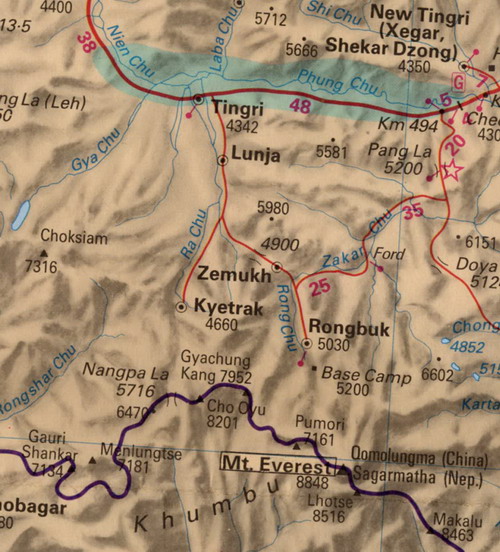China building highway to Everest, no hotel - yet….
|
|||||
China on Wednesday confirmed the construction of a 110-km-long metalled highway in Tibet to Mt Everest in an attempt to provide an additional bonanza to the world at the time of the Olympics.
The move has sparked off howls of protests from environmentalists while in New Delhi there has been muted anxiety over security issues.
The highway is being laid on the Tibet side. It will involve leveling an unpaved track and could take about four months.
Chinese authorities on Wednesday said it will press ahead with the construction despite concerns from environmentalists. They also did not rule out building hotels in future in the fragile Himalayan region.
Environmentalists say the move will wreak havoc in the Himalayan region as it will deluge the area with tourists, which would damage the delicate eco-system. They say the approach to Everest from Nepal has already seen significant environmental damage.
The fragile Himalayan ecosystem is already bearing the brunt of global warming and this has caused immense damage to the glacial areas.
But officials in Lhasa appear determined to go ahead.
"People have been complaining about the poor road conditions to the base camp. It is not a safe road. It is hoped that the road can be improved so as to provide more convenience to tourists in the future," Qiangba Puncog, Chairman of the Tibet autonomous regional government, says.
China says the construction of the highway will be completed before August 2008, in time for the Beijing Olympic Games.
"We`ll ensure completion of the road by all means by next August," Qiangba said.
The project aims to turn a 110-km rough road linking Tingri County of Xigaze Prefecture at the foot of the mountain to the Base Camp into a blacktop highway fenced by undulating guardrails.
On completion, the highway will become a major route for tourists and mountaineers who are crowding onto Mt Qomolangma (Chinese name for Mt Everest) in ever-larger numbers.
"More tourists are flocking into the Qomolangma Base Camp in the recent two years," said Puncog. "Tourists from Europe and America in particular like to have a glimpse of the Mount Qomolangma."
Some of the tourists, he said, had complained the road there was in poor condition and unsafe.
Organisers of the Beijing Olympics Games have revealed ambitious plans for the longest torch relay in Olympic history — a 137,000-km, 130-day route that would cross five Continents and scale the world`s summit, which straddles the border between China and Nepal.
(With PTI inputs)
2007-06-20 16:07:04 -
BEIJING (AP) - There are no plans to build a hotel along a planned highway to a base camp on Mount Everest, a top Tibetan official said Wednesday, although he would not rule out the idea in the future. The blacktop road, budgeted at 150 million yuan (US$19.7 million; ¤14.7 million), was designed to ease the
Olympic torch`s journey to the peak of the world`s tallest mountain next year _ expected to be one of the highlights of the relay. Currently, there is a 108-kilometer (67-mile) rough path from the foot of the mountain to a base camp at 5,200 meters (17,060 feet). Xiangba Pingcuo, chairman of China`s Tibet Autonomous Region, said the road was being built in order to «facilitate visitors to Mount Qomolangma» but that there were no specific plans for construction of any other facilities.
Qomolangma is the Chinese name for Mount Everest.
«Because of the high elevation, which is more than 5,000 meters, it is impossible to build any hotels there because for ordinary people it will be extremely difficult for them to spend the night over there,» he said, adding that mountain climbers come with their own tents and do not need hotel accommodation.
But he added, «I will not completely rule out the possibility of building hotels in the future.
In April, organizers for the Beijing Summer Olympics announced ambitious plans for the longest torch relay in Olympic history _ a 137,000-kilometer (85,000-mile), 130-day route that would cross five continents and reach the 8,850-meter (29,035-foot) summit of Everest.
Taking the Olympic torch to the top of the mountain is seen by some as a way for Beijing to underscore its claims to Tibet.
